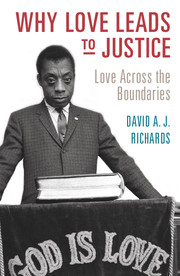Book contents
- Frontmatter
- Dedication
- Epigraph
- Content
- Acknowledgments
- Introduction: Love Resists Injustice
- 1 Breaking the Love Laws as Resistance
- 2 Benjamin Britten and Peter Pears: Love and Resistance
- 3 Christopher Isherwood's Struggle for a Resistant Voice
- 4 Wystan Auden on the Anxiety of Manhood
- 5 Bayard Rustin on Nonviolence
- 6 James Baldwin on Love and Voice
- 7 Eleanor Roosevelt, Margaret Mead, and Ruth Benedict on Resisting Patriarchy
- Conclusion: Moral Injury and Love: Why Love Leads to Justice
- Bibliography
- Index
5 - Bayard Rustin on Nonviolence
Published online by Cambridge University Press: 05 November 2015
- Frontmatter
- Dedication
- Epigraph
- Content
- Acknowledgments
- Introduction: Love Resists Injustice
- 1 Breaking the Love Laws as Resistance
- 2 Benjamin Britten and Peter Pears: Love and Resistance
- 3 Christopher Isherwood's Struggle for a Resistant Voice
- 4 Wystan Auden on the Anxiety of Manhood
- 5 Bayard Rustin on Nonviolence
- 6 James Baldwin on Love and Voice
- 7 Eleanor Roosevelt, Margaret Mead, and Ruth Benedict on Resisting Patriarchy
- Conclusion: Moral Injury and Love: Why Love Leads to Justice
- Bibliography
- Index
Summary
The previous three chapters explored the struggle for the resisting voice of four British gay artists (Britten, Pears, Isherwood, and Auden), once close friends and indeed artistic collaborators, joined in resistance to British patriarchal manhood and the imperialism it supported as well as, implicitly, to British homophobia. My analysis connected their resistance on all these fronts to the role resistance to patriarchy played both in their early relationships to their families of origin and in later friendships and loves. Sometimes that resistance was supported by their mothers, and sometimes it contested their mothers' complicity with patriarchy (for Isherwood, throughout his life; for Auden, until his religious conversion). My focus was on the role such resistance played as the crucial variable in explaining when breaking the Love Laws freed creative ethical voice to resist injustice and when it did not. This chapter and the next turn to the similar resistance of Americans – the resistance of two black gay men to American racism and homophobia; in Chapter 7, the resistance of two remarkable white American women, whose lesbian love unleashed a voice resisting American sexism and racism and, implicitly, homophobia. If my analysis works for these Americans, as it did for the Britons, it shows how this resistance illuminates very different contexts and backgrounds. Resistance to patriarchy, suitably nuanced and contextual, is the heart of the matter. That the point has not been seen illustrates, I believe, how deeply an uncritical patriarchy continues to dominate our thinking even though it contradicts our experience, certainly, our experience of resisting injustice as a continuing force in our private and public lives.
The resistance to British imperialism of the Britons I studied resisted, implicitly, the racism that sustained it. All these men were, however, white, and they were from fairly privileged backgrounds in the structure of British life and the imperialism that sustained it. It is all the more remarkable that they come to resist British imperialism, but they do so very much from within, yet also from outside; their struggles as gay men to find love is one of their shared motives to form the kind of “Society of Outsiders” – both within and outside British patriarchy – that Virginia Woolf had called for.
- Type
- Chapter
- Information
- Why Love Leads to JusticeLove across the Boundaries, pp. 124 - 149Publisher: Cambridge University PressPrint publication year: 2015



